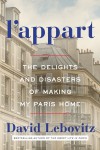19
Followers
19
Following
M Sarki
Besides being a poet with four collections published, M Sarki is a painter, film maker, and photographer. He likes fine coffee and long walks.
M Sarki has written, directed, and produced six short films titled Gnoman's Bois de Rose, Biscuits and Striola , The Tools of Migrant Hunters, My Father's Kitchen, GL, and Cropped Out 2010. More details to follow. Also the author of the feature film screenplay, Alphonso Bow.
Currently reading
L'Appart: The Delights and Disasters of Making My Paris Home
We Learn Nothing: Essays
Elmet: LONGLISTED FOR THE MAN BOOKER PRIZE 2017
Limbo, and Other Places I Have Lived: Short Stories
The Double Life of Liliane
At Home with the Armadillo
American Witness: The Art and Life of Robert Frank
Autumn
Inside Out: A Personal History of Pink Floyd (Reading Edition)
American Witness: The Art and Life of Robert Frank
Raymond Carver's What We Talk About When We Talk About Love: Bookmarked
 https://msarki.tumblr.com/post/168266456393/raymond-carvers-what-we-talk-about-when-we-talk
https://msarki.tumblr.com/post/168266456393/raymond-carvers-what-we-talk-about-when-we-talkWhat a multi-faceted memoir and critical review focusing on the work of Raymond Carver as well as the writing career of the author [a:Brian Evenson|48355|Brian Evenson|https://images.gr-assets.com/authors/1237495626p2/48355.jpg]. This engaging work highlights the parallels and genesis devolved within both their somewhat parallel literary relationship with the infamous editor [a:Gordon Lish|232097|Gordon Lish|https://images.gr-assets.com/authors/1267719924p2/232097.jpg]. Learning the history of Evenson’s development as a writer and scholar, and being privy to a few of the trials he sustained while maturing to become the elder Evenson of today, by turns, is an interesting story. And much will still come to be written of Gordon Lish. Other writers who have worked under the tutelage of this great teacher and editor will also add their personal experience to an already growing oeuvre.
Brian Evenson’s fiction was first introduced to me in seasonal increments discovered in the Lish-edited litmag titled The Quarterly originally published by Random House beginning in 1987. That early work of Evenson’s scared the bejeezus out of me as I recognized a budding genius perhaps the measure of another favorite writer of mine going by the name of [a:Cormac McCarthy|4178|Cormac McCarthy|https://images.gr-assets.com/authors/1414695980p2/4178.jpg]. Unfortunately (and perhaps unfairly) I eventually tired of Evenson’s fiction but always kept his character and personage in high esteem due to his extensive Lilly research into the Carver-Lish relationship as well as his own struggles with the Mormon church. This book not only details his Mormon troubles but eventually describes a segment of his important scholarly research regarding the Carver-Lish relationship. Evenson’s eventual discarding of this critical study he had for so long revised and attempted to have published has now been acquired and stored in academia for other scholars to one day have a go again regarding the primary subject of ethical editing.
If you visit the Lilly Library in Bloomington, Indiana as I did several years ago, it is surprising to see first hand the actual re-writing of Carver’s manuscript by Lish’s own pen. The collection that made Carver a household name, highlighted within the title of this very book, can be fairly credited to the editing and revisions of Gordon Lish. It was perhaps unfair to Carver that Lish did what he did. Perhaps the overzealous Lish had ideas of his own on his way to being famous in his own right. I can attest that Gordon Lish as my editor and teacher never re-wrote anything of mine. However, he did teach me how to more critically read and to write. The most he ever did as my editor was circle a word and tell me to beat it. He may have crossed out a line or even an entire page he felt was not strong enough and marked the spot in which I might start over, or a few times suggest a possible word or two as teacher, but never did he write words for me and let me call them my own. And as time crept on the majority of my submitted poetry was accepted by Lish as written, he adding no marks nor demands for me to better it, just adding his customary ✔︎ as approved or his occasional word of Great! or Yes! written in the margins. It was not long after I had finally gained his predictable approval of my submitted work that I grew restless to try my hand at other literary endeavors. Subsequently our relationship began to evanesce without the constant mutual nurturing that previously existed.
Evenson details similar editing practices in his own personal relationship with the editor Lish. To Evenson’s credit he admits to sometimes happily, and at times reluctantly, accepting a Lish revision, but he also had the courage to resist him. Carver did not exhibit the same courage in confronting the great Lish until Carver was already famous. Raymond Carver holds his own personal place setting strapped into the yoke and hardware of sin of their collaborative endeavor. And as much as I love and admire the fiction of Raymond Carver, he was not exactly honest in his portrayal of what really did occur. His sin of omission exists for all interested parties to witness for themselves. Meanwhile, Brian Evenson lives to tell us his most fascinating story regarding this piece of literary history.







